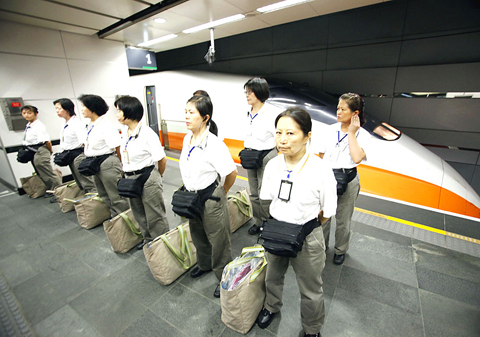Taiwan High Speed Rail Corp (THSRC, 台灣高鐵) chairwoman Nita Ing (殷琪) stepped down from her post yesterday and an ad hoc board meeting elected chief executive Ou Chin-der (歐晉德) to replace her.
Ing, 54, who founded THSRC in July 1998 after winning the nation’s first build-operate-transfer contract to construct the north-south high speed railway two years earlier, said she hoped her resignation could help reverse the company’s finances.
“My career means nothing if more government participation can help the company run smoothly and profitably,” Ing said through THSRC spokesman Ted Chia (賈先德).

PHOTO: NICKY LOH, REUTERS
Chia said Ing announced her decision to step down at the beginning of the board meeting and the board named Ou to the chairmanship under his capacity as the legal representative of the state-run China Aviation Development Foundation (航發會).
The reshuffle, which took effect immediately, ushers in a new era for THSRC, one in which the government will assume a dominant role in deciding the board lineup and management.
The government has a nearly 40 percent stake in the company. THSRC has accumulated more than NT$450 billion (US$13.8 billion) in debts and is seeking a syndicated loan worth NT$390 billion.
Neither Ing nor Ou showed up at the unscheduled press conference after the board meeting. Chia said Ing would remain a board member representing Continental Engineering Corp (大陸工程), one of THSRC’s five founding shareholders, while Ou would serve as both THSRC chairman and CEO.
Last night, however, the company said in a stock exchange filing that Ing would also step down from the board and Continental Engineering would nominate a successor soon.
Chia said the company would call an extraordinary shareholders’ meeting on Nov. 10 to elect a new board of directors and supervisors.
He declined to comment on reports that Ing resigned to ensure government support for the bank loan.
“The former chairperson made no mention of such pressure,” Chia said. “She did extend gratitude to all THSRC employees for helping realize the high speed rail project.”
Ou, 65, a civil engineer by training, will soon brief the media on how he plans to improve the company’s finances and operations, Chia said.
Ou joined the public service sector in the late 1980s and has worked for the national expressway engineering bureau, the public construction commission and the central government. In 1998, he was tapped by then-Taipei mayor Ma Ying-jeou (馬英九) to serve as deputy mayor. He retained his friendly ties to Ma and the Chinese Nationalist Party (KMT) after joining THSRC in 1996 at Ing’s invitation.
Ou has avoided reporters since news broke over the weekend that Ing would be stepping down. Premier Wu Den-yih (吳敦義) said on Sunday that Ing planned to resign.

TARIFFS: The global ‘panic atmosphere remains strong,’ and foreign investors have continued to sell their holdings since the start of the year, the Ministry of Finance said The government yesterday authorized the activation of its NT$500 billion (US$15.15 billion) National Stabilization Fund (NSF) to prop up the local stock market after two days of sharp falls in reaction to US President Donald Trump’s new import tariffs. The Ministry of Finance said in a statement after the market close that the steering committee of the fund had been given the go-ahead to intervene in the market to bolster Taiwanese shares in a time of crisis. The fund has been authorized to use its assets “to carry out market stabilization tasks as appropriate to maintain the stability of Taiwan’s

STEEP DECLINE: Yesterday’s drop was the third-steepest in its history, the steepest being Monday’s drop in the wake of the tariff announcement on Wednesday last week Taiwanese stocks continued their heavy sell-off yesterday, as concerns over US tariffs and unwinding of leveraged bets weighed on the market. The benchmark TAIEX plunged 1,068.19 points, or 5.79 percent, to 17,391.76, notching the biggest drop among Asian peers as it hit a 15-month low. The decline came even after the government on late Tuesday authorized the NT$500 billion (US$15.2 billion) National Stabilization Fund (國安基金) to step in to buoy the market amid investors’ worries over tariffs imposed by US President Donald Trump. Yesterday’s decline was the third-steepest in its history, trailing only the declines of 2,065.87 points on Monday and

TARIFF CONCERNS: The chipmaker cited global uncertainty from US tariffs and a weakening economic outlook, but said its Singapore expansion remains on track Vanguard International Semiconductor Corp (世界先進), a foundry service provider specializing in producing power management and display driver chips, yesterday withdrew its full-year revenue projection of moderate growth for this year, as escalating US tariff tensions raised uncertainty and concern about a potential economic recession. The Hsinchu-based chipmaker in February said revenues this year would grow mildly from last year based on improving supply chain inventory levels and market demand. At the time, it also anticipated gradual quarter revenue growth. However, the US’ sweeping tariff policy has upended the industry’s supply chains and weakened economic prospects for the world economy, it said. “Now

TAKING STOCK: A Taiwanese cookware firm in Vietnam urged customers to assess inventory or place orders early so shipments can reach the US while tariffs are paused Taiwanese businesses in Vietnam are exploring alternatives after the White House imposed a 46 percent import duty on Vietnamese goods, following US President Donald Trump’s announcement of “reciprocal” tariffs on the US’ trading partners. Lo Shih-liang (羅世良), chairman of Brico Industry Co (裕茂工業), a Taiwanese company that manufactures cast iron cookware and stove components in Vietnam, said that more than 40 percent of his business was tied to the US market, describing the constant US policy shifts as an emotional roller coaster. “I work during the day and stay up all night watching the news. I’ve been following US news until 3am